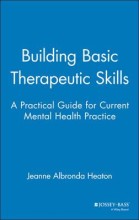Try our study magic for free
Summary: Building Basic Therapeutic Skills: Practical Guide For Current Mental Health Practice | 9780787939847 | Jeanne Albronda Heaton
- This + 400k other summaries
- A unique study and practice tool
- Never study anything twice again
- Get the grades you hope for
- 100% sure, 100% understanding
a PDF, study it super fast
- No sign up, email or credit card needed!
- AI makes unlimited flashcards
- Get unlimited quizzes and tests
- Ask AI anything
- No sign up, email or credit card needed!
- Have and keep perfect overview
- Make flashcards, notes and mind maps
- Review, test and score!
Read the summary and the most important questions on Building Basic Therapeutic Skills: Practical Guide For Current Mental Health Practice | 9780787939847 | Jeanne Albronda Heaton
-
0 introduction
This is a preview. There are 1 more flashcards available for chapter 0
Show more cards here -
what are core therapeutic skills?
-become an effective observer;
-establish rapport;
-manage an initial interview;
-communicate essential information;
-create therapeutic contracts;
-manage difficult moments;
-balance personal response and professional obligations;
-communicate effectively with superiors. -
1 developing observational skill
This is a preview. There are 2 more flashcards available for chapter 1
Show more cards here -
which skill provides the basis for all other therapeutic skills?
observational skills refers to what you see and hear and how you collect information to understand your clients. observation occurs for a large part unconsciously and as a therapist you also consciously observe what you otherwise take for granted. -
what is important when observing?
not to take a too narrow perspective; try to be open for alternative explanations while forming a working hypothesis, don't get locked in on your first idea. revise and reevaluate your initial observations when therapy progresses. -
which four basic factors do you need to observe?
1) non-verbal cues
2) verbal expression
3) relationship between spoken (verbal) and body (non-verbal) language
4) your reactions. -
1.1 observing non-verbal cues
-
what are non-verbal cues?
clothing, grooming, eye-contact, posture, mannerism, etc. -
1.1.1 general appearance
This is a preview. There are 1 more flashcards available for chapter 1.1.1
Show more cards here -
what are aspects of general appearance?
age, gender, height, weight, ability to move, complexion, eyes, race, etc. -
1.1.2 clothing and grooming
This is a preview. There are 2 more flashcards available for chapter 1.1.2
Show more cards here -
what information can clothing and grooming provide?
information on work, sub-culture and self-care (=important starting point). -
which mental disorders are connected to problems with self-care?
depressions, psychosis, drug abuse -
what is the danger of making assumptions based on observed clothing and grooming?
we may react based on stereotypes that we hold; so there is again a need to stay open for alternative interpretations. -
1.1.3 facial expression
This is a preview. There are 4 more flashcards available for chapter 1.1.3
Show more cards here -
what are examples of facial expressions?
smiles, frowns, grimaces, blank stares, etc.
- Higher grades + faster learning
- Never study anything twice
- 100% sure, 100% understanding
Topics related to Summary: Building Basic Therapeutic Skills: Practical Guide For Current Mental Health Practice
-
Developing observational skill - observing non-verbal cues - facial expression
-
Developing observational skill - observing non-verbal cues - eye contact
-
Developing observational skill - observing non-verbal cues - tears
-
Developing observational skill - observing verbal expression
-
Developing observational skill - observing the interaction of verbal and non-verbal behavior
-
Developing observational skill - observing yourself
-
Essential evaluations and assessments - presenting problems - what shall we work on?































